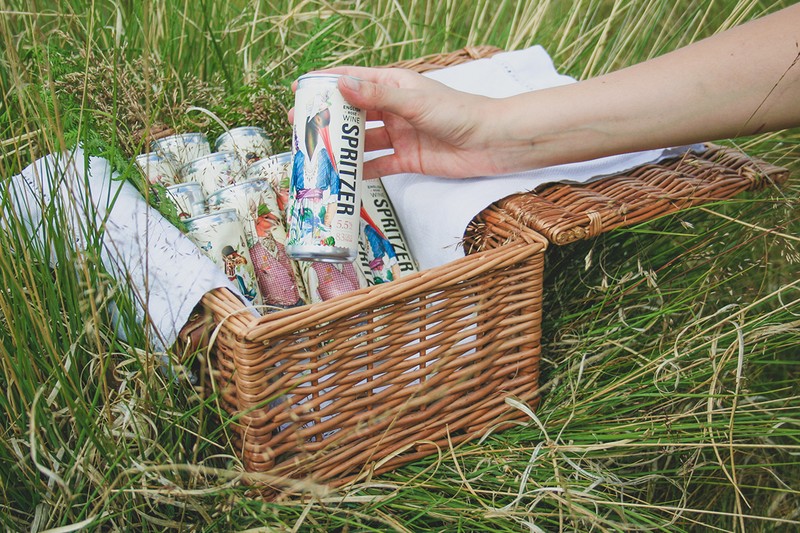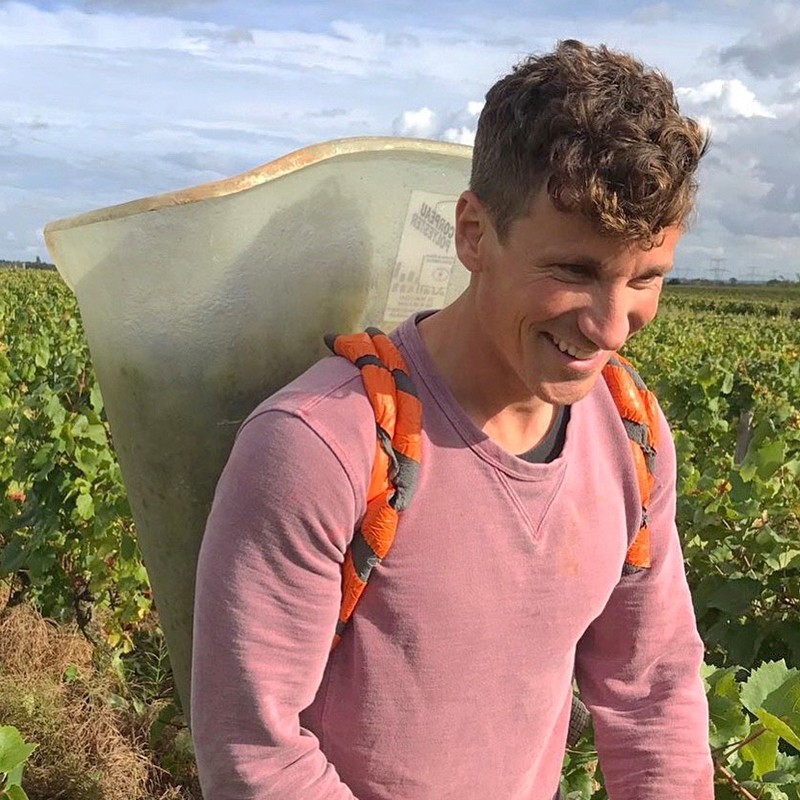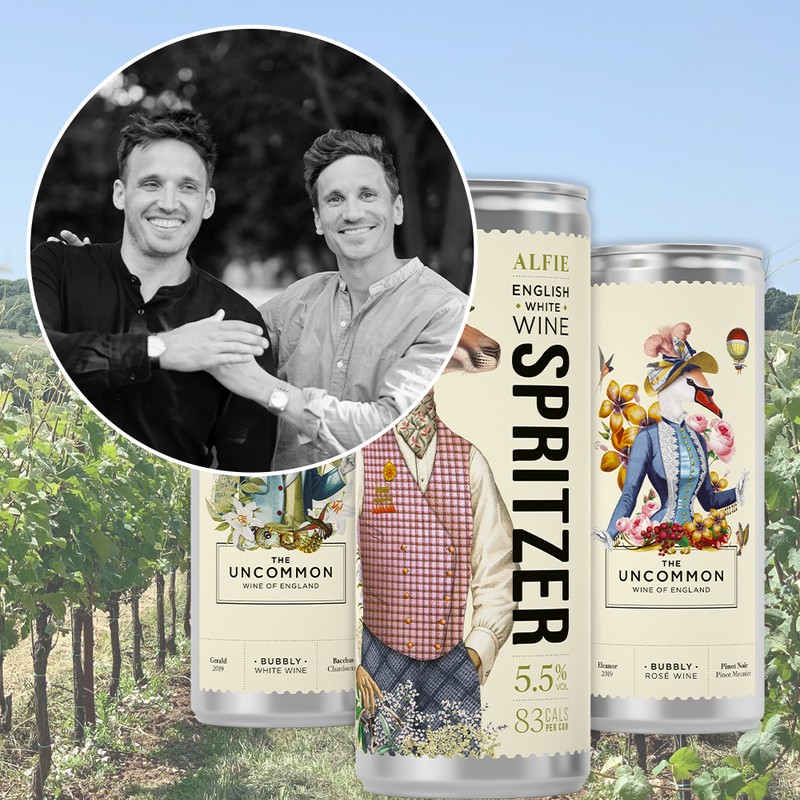How Canned Wine Became Cool
Tell us a bit about yourselves… How did you get here?
Henry: I lived in the States and saw first hand the success of Californian canned wine. It had never been done in the UK, but we knew we had the same open-minded consumers – despite the ‘old world’ mentality. Meanwhile, English wine was starting to get global recognition, so it felt like the right time. We quit our jobs, studied cool-climate grape growing and wine making, and gave it a go.
Before we set up The Uncommon I was doing real-estate investment and Alex was in graphic design. We had always talked about starting the business. It was a gamble, but I think being ‘outsiders’ gives us an edge. We’re not led by the industry norms, but by what we see as the most logical thing to do at each stage. In the beginning, we knew we had to change the perception of ‘the can’ to be successful. We have always believed in the format but knew the product had to look amazing. This is where Alex comes in. We are a good mix and have our own responsibilities and accountability, which so far has worked well.
What has made canned wine so popular?
Alex: Sustainability, convenience and quality. Glass is cumbersome – it’s around half a kilo per bottle – it breaks easily, it lets light and air in, and takes a million years to break down. It also takes ages to cool and requires a load of single-use materials to protect it. Over 95% of wines are drunk within the first year of purchase, so they’re not sitting in cellars, where bottles would be useful. For all of these reasons, bottles don’t make sense all of the time.
As alternatives go, plastic is obviously a no-no, but a can is endlessly recyclable and safe. It chills fast and is easy to take around – beach, hike, bike ride, festival, picnic or just as a single-serve option when you don’t want a bottle.
Who’s drinking it?
Alex: We didn’t set out with a target demographic in mind. It’s aimed at an open-minded person who demands quality. At £5 a can – versus £25 for a bottle – we’re an entry point to high-quality English wine.
Tell us more about the opportunity you saw with The Uncommon…
Henry: Canned wine is a more sustainable way of making and distributing wine – and the concept had been proven in the US. We also saw some disenfranchised wine drinkers over here: millennials outdrink baby boomers yet there was nothing out there that spoke to the younger, more adventurous consumer.
Alex: The walls of wine in supermarkets, with their copy-and-paste fancy labels covered in impenetrable tasting notes, can be intimidating. We took our cues from outside the wine world to create something fun and accessible.
Which of your skills have been crucial to getting the business to this stage?
Alex: Not a skill but the fact we don’t speak like wine people! We’re about democratising good-quality wine.
Henry: There’s sheer doggedness too. Alex does our branding and packaging; I lean more towards the business/production side. I retrained in wine and worked with some big UK producers – like Hattingley Valley and Nyetimber – to earn my stripes in viticulture, oenology and on the finance side.
What do you relish about having your own business?
Henry: The freedom it gives us – although it comes with huge pressure too. It has been an amazing challenge. We’ve learnt things we never thought we would have to learn – in hindsight, the naivety we had coming in was necessary. Or else it would have seemed too big an ask. Looking now at what we’ve achieved, it is so rewarding.
Alex: We both came from large corporates. When you step back, you see how wasteful reporting up and down is. It’s refreshing to make quick decisions, be nimble and agile, and in charge of your own path. We can take pride in pushing the industry forwards, exploring new formats and more sustainable processes, being first to market with innovative products and design, fostering new talent and being ‘thoughtful disruptors’. We don’t just do what we do as a trend or fancy – we wholeheartedly believe that our format and small footprint has a part to play in the future of the industry.


What have you learnt that might apply to anyone’s career?
Henry: The importance of a strong work ethic. We never switch off – we always think and talk about the business. This is good and bad, but we believe you need to live your passion to be successful. I’d advise people reading to never be afraid of asking the dumb question. Knowing nothing is so liberating. When you’re part of a big organisation, you are expected to know everything. Actually, no one does, so those that are inquisitive can be successful.
Alex: Corporations reward the extroverts. Henry and I are both introverts – and the introvert can be underappreciated. If that’s you, find something you love – or find an opportunity – and go all in. We quit our jobs and gave ourselves 18 months to make meaningful progress. It was two years before we paid ourselves, but if we had been half in half out it wouldn’t have worked.
How do you advise entrepreneurs to navigate the risks that come with going it alone?
Henry: Find supportive partners to work with. On a personal level, both of our wives fully support and believe in us. They were the breadwinners while we tried to get things off the ground and we couldn’t have done it without them.
How do you spot opportunities?
Alex: It all comes down to keeping your eyes open and doing your homework. We spent a lot of time on research to pinpoint the gaps and growth areas. We talked to a lot of people, invested in market reports and looked globally at what was being offered.
How do you build awareness?
Henry: Through thoughtful partnerships – don’t be overly concerned with margins or profits. We have always been very considered about where we are stocked because you can always trickle down, but you can never trickle up. Align yourself with likeminded brands as early as possible – Selfridges ‘discovered’ us and really legitimised our brand. They have a hugely respected wine department and launched us in the off-trade.
Alex: That brand adjacency is so important to us. We have turned down many a large customer because we feel they wouldn’t be right for us at this stage.
How do you get a product into a major retailer?
Henry: We had no pre-existing relationships, so we were definitely at a disadvantage, but we pounded pavements and knocked on doors until we got noticed. Buyers get so many samples each day, so we knew our packaging had to stand out.
How has Covid-19 changed The Uncommon?
Alex: It has made us focus on e-commerce. We’ve developed a new website and business we wouldn’t otherwise have had time to take on. E-commerce allows us to control the customer experience – we have developed new packaging, new fulfilment and customer service options, and it’s taken off at a real pace.
Is now a good time to be launching a business?
Henry: Right now, grocers aren’t launching new products or brands and many of the activation opportunities (especially events) aren’t going ahead. I think we got in at the right time and it will be tough for a few years. However, people are becoming more inward looking – with both Covid-19 and Brexit – which means they are more supportive of locally and thoughtfully made produce, so if you have the right idea, it could still work.
What’s next for The Uncommon?
Henry: You will find out in spring 2021! We are in the lab and the winery now, developing new drinks. Much of what we’re doing is being driven by the younger consumer – millennials and now Gen Z. We want to be the most sustainable wine brand in Europe, and the go-to for premium canned wine. Our focus is the UK: it’s the second largest consumer of Champagne and buys a third of all Prosecco, so we see a huge opportunity domestically.
Alex: If we can take 3% of the UK wine market over the next five years, we would be chuffed.
HENRY & ALEX’S TIPS FOR STARTING A BUSINESS
- It’s hard and lonely. So find a partner to do it with – then live it and breathe it.
- Surround yourself with smarter and more talented people than yourself.
- Remember why you started.
For more about The Uncommon, visit WeAreTheUncommon.co.uk
DISCLAIMER: We endeavour to always credit the correct original source of every image we use. If you think a credit may be incorrect, please contact us at [email protected].


